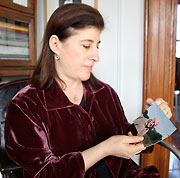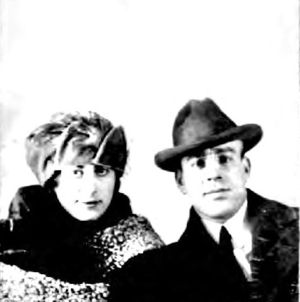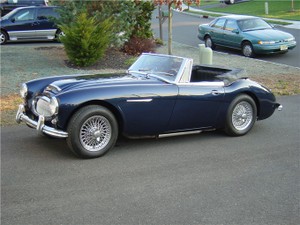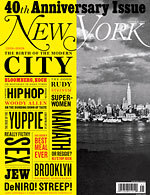
Last week my sister and I went to my father’s apartment in Brooklyn Heights to pack up some more of the LP’s from the back of his closet. There were more than 100 in there and I went through them carefully and pulled out some for myself. The rest we packed up to take to Housing Works Thrift Shop on Montague Street in a variety of shopping bags.
The process was easier this time than last; it wasn’t quite so fraught for me emotionally. I actually enjoyed pulling out an eccentric and eclectic mix including Svajatoslav Richter (my father’s favorite classical pianist), Francis Faye, Nina Simone, Mahalia Jackson, Lotte Lenya, and Paul Robeson among others.
While in the closet, I noticed about 30 small boxes of jazz 78’s as well as two small duffel bags stacked with them. Jazz was my father’s passion. He loved Louis Armstrong, Billie Holiday, Sidney Bechet, Bessie Smith, Teddy Wilson, Duke Elllington, Charlie Parker. The list goes on…
These were his heroes, jazz was his passion and he knew a great deal about it.
When my stepmother asked that we pack up those 78’s and bring them to Housing Works, too I got a lump in my stomach. Later she told me that those were the 78’s my father collected in Los Angeles when he was a teenager.
At the mention of that I knew that I definitely didn’t want to make any decisions about those records; I just wasn’t ready. I didn’t really want to look at them let alone lift them out of the closet and bring them downstairs. It made me sick to even think about it.
I imagined all the places these records had been. He’d moved them from Los Angeles to Berkeley where he went to college and then back to UCLA, where he went to grad school. Then he moved them to various apartment in the West Village, where he was a young bachelor. Then he moved them to University Place where he lived with my mother; to Midwood Brooklyn when my sister and I were born (and we lived for a year with my mother’s parents). Then they traveled to Riverside Drive and finally Brooklyn Heights where he settled with my stepmother.
They obviously meant a great deal to my father but he never mentioned them to us or said anything about them in his will.
I was overwhelmed with confusion and sadness for those traveling records.
My sister felt differently. It’s not that she wanted to cart them off to Housing Works with the LP’s, but she wanted to find a good home for them. So she packed them up in two large blue IKEA totes and lugged them down the stairs.
I was furious because I thought they should stay in my father’s closet a little while longer. What was the harm in that? Time is a good thing. Perhaps we’d know better what to do in a few weeks or months. Maybe Teen Spirit would want them in the future. Or OSFO.
But when we got them into the car I understood my sister’s motivations.
"Let’s make some calls. Let’s find out what they’re worth, if anyone wants them." she said.
After dropping off the LPs at the thrift show, we had lunch at Theresa’s, the Polish luncheonette on Montague Street. Over bowls of cabbage soup, we agreed that we didn’t want to sell them but we wanted to give them to a place that would honor my father’s habit of collecting.
That evening, my sister already had a list of possible places, including the Institute of Jazz Studies at Rutgers University, Jazz at Lincoln Center, a jazz record shop on West 26th Street. She even called Phil Schaap at WKCR, Columbia University’s radio station.
The next day my sister got a call back from Phil Schaap. My father loved his jazz shows on WKCR, including the Louis Armstrong Centennial Festival Part I (June 30 – July 7, 2000; 184 hours), the Duke Ellington Centennial Festival (April 23 – May 1, 1999; 240 hours) and a two-week John Coltrane Festival is currently planned for the spring of 2004.
He also loved the 14 annual ‘Birthday Broadcasts,’ 24-hour marathons that celebrate the birthdays of the pivotal figures in jazz history as holidays, as well as the Memorial Broadcasts’ which pay tribute to musicians upon their passing and alert the jazz community to memorials and funeral plans.
Schaap said that he didn’t want the 78’s and that he was pretty sure that Lincoln Center, where he is a curator, wouldn’t want them. He did say that he could probably find some graduate students that would be happy to take them off our hands.
"My father really loved your show," my sister told him.
"Thank you very much," he said obviously moved.
In the meantime, I mentioned the 78’s to my friend Betsey who said that her partner Tom would be interested in keeping them. They have a house in upstate New York, where Tom has a turntable that plays 78’s.
It seemed like a good solution. I imagined that we could make occasional pilgrimages to their house and listen to the 78’s.
Later that day, my sister, who was eager to get the two Ikea bags full of 78’s out of her car, drove them over to Tom in Carroll Gardens, who seemed excited to go through the records.
Hours later I understood why bereavement experts say not to clean out closets, or give away clothing until you feel ready. I felt angry that we had to make a decision about the 78’s. I wanted to call Tom and say, I think we made a mistake, I want them back.
I felt bereft because this evidence of my father’s teenage self in the used record stores of Los Angeles was lost forever.
Thankfully, those feelings passed. Later I felt grateful that a friend had the 78’s and that they would stay together in a nice house in upstate New York. Sort of like a museum. A museum to Monte Ghertler as a teenager, obsessively going around Los Angeles looking for the music of his heroes on these heavy old records.
photo by Caroline Ghertler
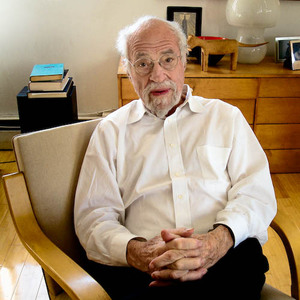 Here is the eulogy I read at my father’s funeral on September 10, 2008:
Here is the eulogy I read at my father’s funeral on September 10, 2008:

